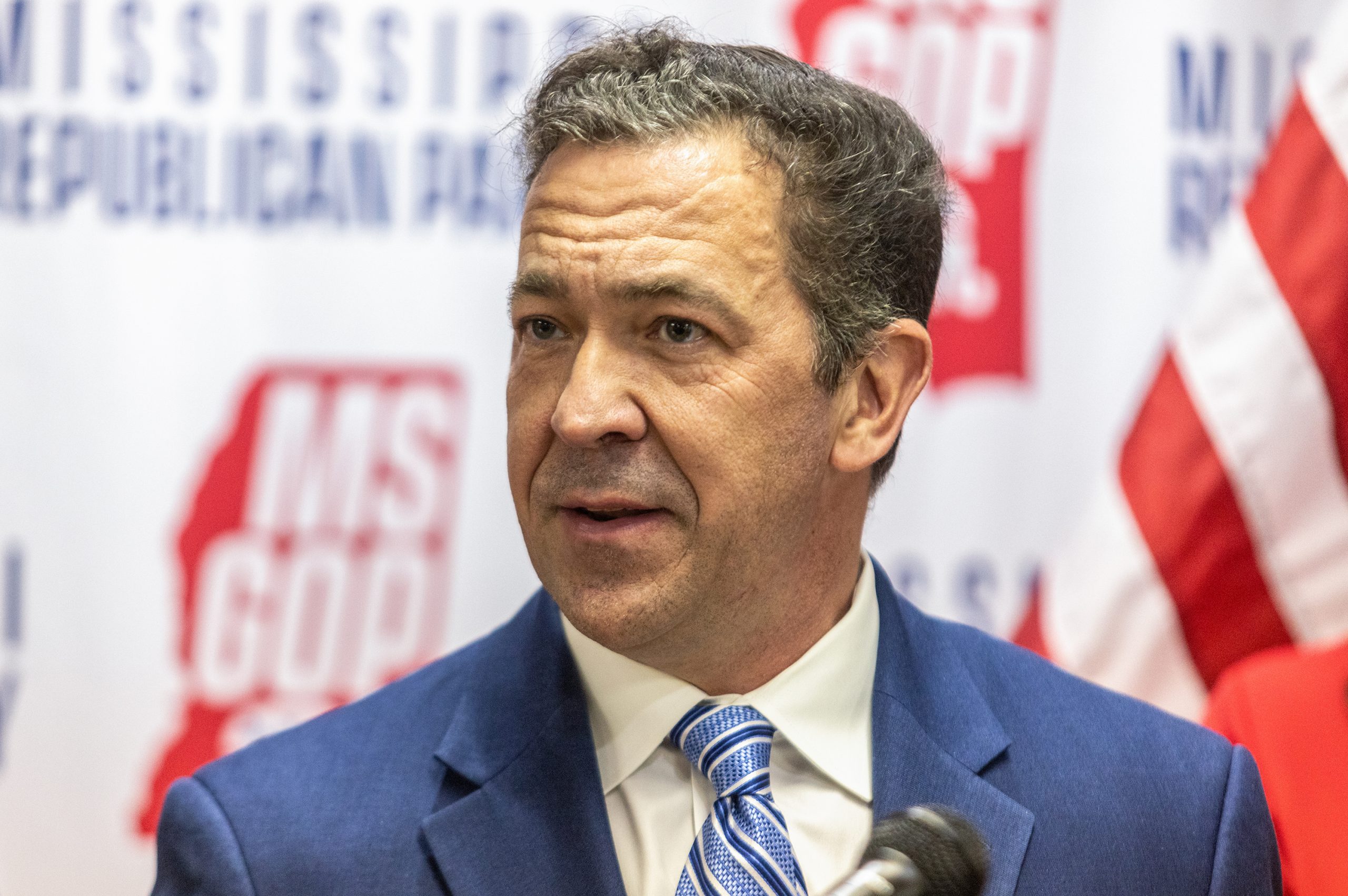Mississippi Today
McDaniel vows to sideline Democratic senators if elected lieutenant governor

In his effort to label incumbent Republican Lt. Gov. Delbert Hosemann “Delbert the Democrat,” challenger Chris McDaniel says Hosemann gives Senate Democrats too much power as committee chairmen.
But Hosemann counters that he's appointed more Republicans to chairmanships than any first-term lieutenant governor and that he routes important legislation to GOP-run committees.
McDaniel, if elected, vows to break with Republican lieutenant governor predecessors Hosemann, Gov. Tate Reeves, former Gov. Phil Bryant and Amy Tuck and appoint only Republicans to Senate chairmanships.
“As lieutenant governor, I will empower my Republican colleagues and appoint Republican senators to all chairmanships,” McDaniel said in a statement.
But McDaniel faces at least one challenge in that: math.
The Senate has 41 standing and joint committees.
The Mississippi Senate has 52 members. There are 36 Republicans and 16 Democrats, a number not expected to drastically change with this year's election.
Further complicating things, of the 36 current Republicans, there are 11 freshmen. While there are occasional exceptions, unless they come in with specific expertise, freshmen are not usually appointed to major chairmanships until they've served at least a term because they haven't learned the ropes of legislating and how to run committees.
Under McDaniel's vow, it would appear some Republican senators would chair multiple committees. Unlike the House, there is no Senate rule against one member chairing multiple standing committees, but it would create a heavy workload for someone doing so, and concentrate much power into a smaller, less diverse group.
Under the current Senate makeup, this would also mean McDaniel would appoint no Black senators to chairmanships, despite Mississippi having the highest percentage Black population in the nation, 38%. An all-white Senate leadership team would hearken back to Mississippi's Jim Crow past style of governance.
Hosemann has appointed 13 of the 16 current Democratic senators to chairmanships. This is the same number of Democratic chairmen now-Gov. Reeves had in his final term leading the Senate as lieutenant governor. In Reeves' first term as lieutenant governor, he appointed 17 Democrats as committee chairs.
But McDaniel has not accused Reeves, who he endorsed for governor, of closeted Democratic leanings, instead recently saying, “Tate is a conservative.”
Reeves' predecessor, Republican Gov. Bryant, ran a Senate that still had a slim Democratic majority and fewer committees. In his term as lieutenant governor, Bryant had 17 Republican committee chairs and 19 Democrats.
In his statement, McDaniel said: “Lieutenant Governor Delbert ‘the Democrat' Hosemann used his office to further his liberal agenda and undermine Republican lawmakers by appointing Democrats to chair powerful committees. His appointment of Democrats to these pivotal positions undermines the will of Mississippi voters — who elected supermajorities in both chambers for a reason.”
McDaniel points to Sen. Hob Bryan, D-Amory, serving as Public Health Committee chairman — a relatively powerful position in the Legislature — and said Hosemann “appointed one of Mississippi's most liberal leaders to its powerful post.”
But Bryan has served nearly 40 years in the Senate, and held the Public Health chairmanship under Bryant. Under Reeves for two terms, Bryan held the also-powerful post of Judiciary B Committee chairman.
McDaniel, whom Hosemann appointed chair of the Environmental Protection, Conservation and Water Resources Committee, said: “The Democratic Party is so radicalized today, they do not reflect the values of Mississippi, and certainly do not deserve appointment to position of power to wield their socialist agendas.”
Hosemann in a statement said: “I have appointed more Republicans to chair committees during this term than the first term of any lieutenant governor. Additionally, every major piece of legislation has gone through Republican chairmen — from a $525 million tax cut to our election security package to increasing penalties for violent crime to the largest teacher pay raise in the state's history.
“My opponent simply is not being honest about the Senate's conservative achievements and the facts.”
This article first appeared on Mississippi Today and is republished here under a Creative Commons license.
Mississippi Today
On this day in 1945
April 30, 1945

Sister Rosetta Tharpe, known as the “godmother of rock ‘n' roll,” made history by becoming the first gospel artist to rocket up the R&B charts with her gospel hit, “Strange Things Happening Every Day.” In so doing, she paved the way for a strange new sound.
“Rock ‘n' roll was bred between the church and the nightclubs in the soul of a queer Black woman in the 1940s named Sister Rosetta Tharpe,” National Public Radio wrote. “She was there before Elvis, Little Richard and Johnny Cash swiveled their hips and strummed their guitars. It was Tharpe, the godmother of rock ‘n' roll, who turned this burgeoning musical style into an international sensation.”
Born in Arkansas, the musical prodigy grew up in Mississippi in the Church of God in Christ, a Pentecostal denomination that welcomed all-out music and praise. By age 6, she was performing alongside her mandolin-playing mother in a traveling evangelistic troupe. By the mid-1920s, she and her mother had joined the Great Migration to Chicago, where they continued performing.
“As Tharpe grew up, she began fusing Delta blues, New Orleans jazz and gospel music into what would become her signature style,” NPR wrote.
Her hard work paid off when she joined the Cotton Club Revue in New York City. She was only 23. Before the end of 1938, she recorded gospel songs for Decca, including “Rock Me,” which became a huge hit and made her an overnight sensation. Little Richard, Aretha Franklin and Jerry Lee Lewis have all cited her as an influence.
“Sister Rosetta played guitar like the men I was listening to, only smoother, with bigger notes,” said singer-songwriter Janis Ian. “And of course, personally, any female player was a big influence on me, because there were so few.”
After hearing her successors on the radio, Tharpe was quoted as saying, “Oh, these kids and rock and roll — this is just sped up rhythm and blues. I've been doing that forever.”
On the eve of a 1973 recording session, she died of a stroke and was buried in an unmarked grave. In the decades that followed, she finally began to receive the accolades that had eluded her in life.
In 2007, she was inducted into the Blues Hall of Fame, and money was raised for her headstone. Eleven years later, she was inducted into the Rock and Rock Hall of Fame.
“She was, and is,” NPR concluded, “an unmatched artist.”
This article first appeared on Mississippi Today and is republished here under a Creative Commons license.
Mississippi Today
House agrees to work requirement, Senate concedes covering more people in Medicaid expansion deal
With minutes to spare before a Monday-night deadline, House negotiators conceded a Senate demand that Medicaid expansion would include a strict work requirement for those covered — a requirement not likely to be approved by the federal government.
The Senate had already backed off its initial proposal that would only cover the poorest of the poor, would still leave tens of thousands of poor working Mississippians uninsured and would have turned down billions in federal money to cover the costs.
House and Senate negotiators agreed to a deal that would expand Medicaid to about 200,000 people who make up to 138% of the federal poverty level, roughly $20,000 for an individual. It would require recipients to prove they work for at least 25 hours a week.
The plan will be a “hybrid,” as first proposed by the House. People up to 99% of the federal poverty level would be covered by traditional Medicaid. Those making 100% to 138% of FPL would be covered with subsidized private insurance plans from the federal exchange.
Neither House Medicaid Chair Missy McGee, a Republican from Hattiesburg, nor Senate Medicaid Chair Kevin Blackwell, a Republican from Southaven, answered questions from reporters at the Capitol about the agreement on Monday night.
“A compromise requires concessions between the chambers,” Republican Lt. Gov. Delbert Hosemann said in an earlier statement. “The Senate requires a real work requirement, but our plan now covers individuals up to 138 percent of the federal poverty level.”
The Affordable Care Act, the federal legislation that allows states to expand Medicaid coverage, does not authorize work requirements. However, states can seek a federal waiver from the Centers for Medicare and Medicaid Services to implement them.
CMS under the Trump administration did sign off on some states using work requirements, but under the Biden administration, the federal agency has not approved requests and rescinded the ones that had been approved.
The House's original plan directed state officials to seek a waiver for work requirements, but would have expanded Medicaid even if the federal agency denied it. House leaders previously pointed out that people with income above the federal poverty level are likely working.
The Senate, however, drew a hard line that it would only agree to an expansion plan that contained work requirements — a stance that could at the least delay expanded coverage, perhaps for years, or prevent it from ever happening.
READ MORE: House, Senate leaders swap Medicaid expansion proposals as Monday night deadline nears
If CMS denies Mississippi's waiver for a work requirement, the compromise proposal directs the state Division of Medicaid to apply for a work requirement waiver each year the first denial.
It also directs state officials to immediately apply for a waiver if CMS starts approving work requirements in other states.
Senate leaders have expressed optimism that the Biden administration will be so pleased with longtime Medicaid expansion holdout Mississippi making an effort that it would approve a work requirement, or that the conservative federal 5th Circuit Court would approve it if litigated.
Work requirements in states that previously had them proved to be costly and ineffective, with a large amount of costs going into administration of the work requirements instead of medical services.
The agreed proposal will likely bring an end to several days of House and Senate negotiators trading proposals back and forth with one another behind closed doors.
Right up to the 8 p.m. Monday deadline, it was unclear if legislative leaders would reach a compromise. They signed the agreement with only minutes to spare.
Reporters, lobbyists and advocates gathered at the Capitol waiting to see if lawmakers could broker a deal to establish what many believe could be the most transformative state policy since Gov. William Winter's Education Reform Act of 1982.
But despite earlier vows by House and Senate leaders to negotiate Medicaid expansion in public, the final details were worked out behind closed doors and negotiators declined comment Monday night.
Now that the negotiators have signed off on an agreement, the Capitol's two chambers have until Wednesday to either approve the proposal, reject it or send it back to negotiators for further work. The 2024 legislative session is expected to end within days, although lawmakers have already had to push back deadlines for agreeing to a state budget.
The Medicaid expansion proposal places a 3% tax on managed care organizations to cover the state's costs, and the Legislature's rules require a three-fifths majority of the lawmakers in both chambers to approve bills that enact taxes.
But the actual threshold the two chambers likely need to achieve is a two-thirds majority, needed to override a potential veto from Republican Gov. Tate Reeves, a longtime opponent of expansion.
Passage of the compromise, particularly by a wide margin, may be difficult in both chambers. House Democrats, who support Medicaid expansion, have threatened to oppose any bill with a work requirement. Any expansion measure is a tough sell in the Senate, and its earlier more austere plan barely garnered a two-thirds vote.
Senate Minority Leader Derrick Simmons, D-Greenville, on Monday night said he was glad the two chambers came to an agreement and he looks forward to seeing more details.
“I am grateful we are finally at a point where we are working to provide access to health care to Mississippians who desperately need it and have been waiting for it for a long time,” Simmons said.
This article first appeared on Mississippi Today and is republished here under a Creative Commons license.
Mississippi Today
Law enforcement officers’ oversight bill heads to governor’s desk
The Mississippi Senate passed legislation Monday to give the state's officer certification board the power to investigate law enforcement misconduct.
House Bill 691, the revised version of which passed the House Saturday, is now headed to the desk of Gov. Tate Reeves.
The bill comes in the wake of an investigation by the Mississippi Center for Investigative Reporting at Mississippi Today and The New York Times into sheriffs and deputies across the state over allegations of sexual abuse, torture and corruption. The reporting also revealed how a “Goon Squad” of officers operated for two decades in Rankin County.
Public Safety Commissioner Sean Tindell said if the governor signs the bill, he anticipates the Mississippi Board on Law Enforcement Officer Standards and Training would hire a few investigators to investigate matters and make recommendations.
The bill would enable the board to establish a hearing panel on any law enforcement officer “for whom the board believes there is a basis for reprimand, suspension, cancellation of, or recalling the certification of a law enforcement officer. The hearing panel shall provide its written findings and recommendations to the board.”
In addition, deputies, sheriffs and state law enforcement would join police officers in the requirement to have 20 hours of training each year. Those who fail to get such training could lose their certifications.
Other changes would take place as well. Each year, the licensing board would have to report on its activities to the Legislature and the governor.
The bill calls for a 13-member board with the governor having six appointments – two police chiefs, two sheriffs, a district attorney and the head of the law enforcement training academy.
Other members include the attorney general, the public safety commissioner, the head of the Highway Patrol, and the presidents of the police chiefs association, the constable association, the Mississippi Campus Law Enforcement Association and the sheriff's association (or designee).
This article first appeared on Mississippi Today and is republished here under a Creative Commons license.
-
Local News5 days ago
Sister of Mississippi man who died after police pulled him from car rejects lawsuit settlement
-
Mississippi Today5 days ago
At Lake High School in Scott County, the Un-Team will never be forgotten
-
Mississippi Today2 days ago
On this day in 1951
-
Mississippi News3 days ago
One injured in Mississippi officer-involved shooting after chase
-
Mississippi News7 days ago
Viewers make allegations against Hatley teacher, school district releases statement – Home – WCBI TV
-
Mississippi News Video6 days ago
Vehicle struck and killed man lying in the road, Alcorn County sheriff says
-
Mississippi News5 days ago
Ridgeland man sentenced for molesting girl
-
Mississippi News6 days ago
Suspected Dollar General armed robber arrested in Pickens County








































